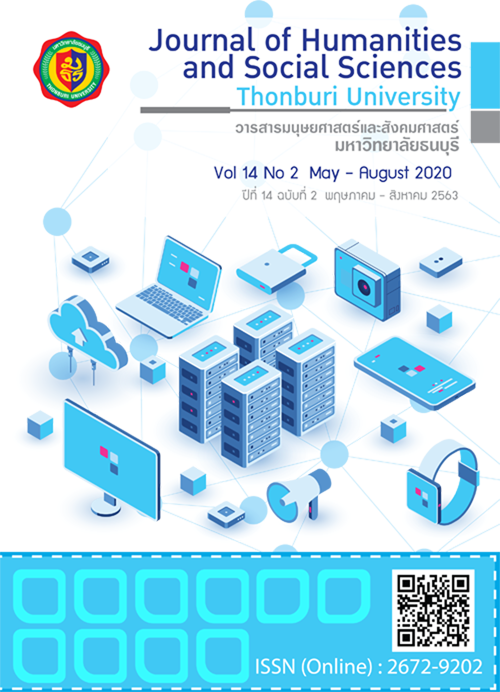Developing English vocabularies mastery and teamwork skill using flashcard game for public health student
Keywords:
Game, Flashcards, Vocabulary, Vocabulary teaching, Teamwork skillAbstract
The aims of this research were: to explore the effectiveness of the use of a flashcard game to enhance students’ English vocabularies, study students’ teamwork interaction, and find satisfaction of students after playing the flashcard game. This study used one-group pre-test post-test research design. The participants were 30 public health students. Three instruments were used: pre-test and post-test, questionnaires, and interview. The results were: (1) Students’ post-test mean score was significantly higher than pre-test. (2) Students rated their teamwork interaction at the highest level. (3) During an interview, students felt that the flashcards game make the learning process more exciting and interesting. (4) Students enjoyed playing this game and felt that it helped them to able to remember vocabulary better. The results of this study may help instructors to use this game to develop students’ vocabulary knowledge.
References
Ahmad, S. R. (2016). Importance of English communication skills. International Journal of Applied Research. 2(3): 478-480.
Ahuja, A. (2011). Education crisis leaves kingdom outclassed. Spectrum. 23(4): 6-7.
Akdogan, E. (2017). Developing vocabulary in game activities and game materials. Journal of Teachingand Education. 7(1): 31-66.
Akın, A.,& Seferoglu, G. (2004). Improving learners’ vocabulary through strategy training and recycling the target words. Hacettepe University Journal of Education. 27: 1-10.
Aliponga, J., & Johnston, C. C. (2013). Benefits of using vocabulary flash cards in EFL classroom. 研究紀要.14(1): 1-6.
Alqahtani, M. (2015). The importance of vocabulary in language learning and how to be taught. International Journal of Teaching and Education. 3(3): 21-34.
Atkinson, R. C. (1975). Mnemotechnics in second-language learning. American Psychologist. 30(8): 821 -828.
Azar, A.S. (2012). The effect of games on EFL learners’ vocabulary learning strategies. International Journal of Basic and Applied Science. 1(2): 252-256.
Basoglu, E. B., & Akdemir, O. (2010). A comparison of undergraduate students' English vocabulary learning: using mobile phones andflash cards.The TurkishOnline Journal of Educational Technology. 9: 1-7.
Bradley, R. A. (2004). English for Nursing and Health Care. Singapore: Mc Graw-Hill.
Brinton, D. M. (2013). Tools and techniques of effective second/foreign language teaching. In M. Celce-Muria, D. Brinton, & A. Snow (Eds.), Teaching English as a Second or Foreign Language.4thed. (pp. 340-361). Boston, MA: National Geographic Learning/Cengage Learning.
Cameron, L. (2001). Teaching languages to young learners. Cambridge: Cambridge University Press.
Chien, C. W. (2015). Analysis the effectiveness of three online vocabulary flashcard websites on L2 learners’ level of lexical knowledge. English Language Teaching. 8(5): 111-121.
Chiocchio, F., Forgues, D., Paradis, D., & Iordanova, I. (2011). Teamwork in integrated design projects: Understanding the effects of trust, conflict, and collaboration on performance. Special Issue: Special IRNOP Research Conference. 42(6): 78-91.
Derakshan, A., & Khstir, E. D. (2015). The effects of using games on English vocabulary learning. Journal of Applied Linguistics and Language Research. 2(3): 39-47.
Divjak, B., & Tomic, D. (2011). The impact of game-based learning on the achievement of learning goals and motivation for learning mathematics - Literature review. JIOS, 35(1), 15-30.
Dumblekar, V. & Soranastaporn, S. (2019). Salad bowl, a game in teamwork. The Liberal Arts Journal. 2(1): 13-17.
Guhaita, P., Lei, P., & Tews, M. J. (2015). Making teamwork work: Team knowledge for team effectiveness. The Journal of Psychology: Interdisciplinary and Applied. 150(3): 1-22.
Heron, T. E., Heward, W. L., Cooke, N. L., & Hill, D. S. (1983). Evaluation of a classwide peer tutoring system: First graders teach each other sight words. Education and Treatment of Children. 6(2): 137-152.
Honarmand, R., Rostampour, M., & Abdorahimzadeh, S. J. (2015) The effect of game tic tac toe and flash cards on zero beginners’ vocabulary learning. International Journal of Educational Investigations. 2(3): 27-41.
Hsueh-chao, M. H., & Nation, P. (2000). Unknown vocabulary density and reading comprehension. Reading in a Foreign Language. 13(1): 403–430.
Hwang, G. J., Chiu, L. Y., & Chen, C. H. (2015). A contextual game-based learning approach to improving students’ inquiry based learning performance in social studies courses. Computers & Education. 81(1): 13-25.
Insaniyah (2008). The use of flashcards in teaching English for the sixth year students of SDN 1 Tuntang in the academic year of 2002-2003. Register. 2(2): 161-172.
Kornell, N. (2009). Optimising learning using flashcards: Spacing is more effective than cramming. Applied Cognitive Psychology. 23(9): 1297-1317.
Laufer, B. (2010). Lexical threshold revisited: Lexical text coverage, learners’ vocabulary size and reading comprehension. Reading in a Foreign Language. 22(1): 15-30.
Loparev, A. (2016). The impact of collaborative scaffolding in educational video game on the collaboration support skills of middle school students. (Doctor of Philosophy Dissertations, University of Rochester).







